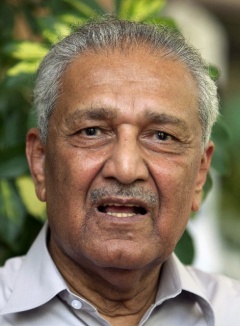Abdul Qadeer Khan
( scientist) | ||||||||||||||
|---|---|---|---|---|---|---|---|---|---|---|---|---|---|---|
 | ||||||||||||||
| Born | 1 April 1936 Bhopal, India | |||||||||||||
| Nationality | Pakistani | |||||||||||||
| Alma mater | • Karachi University • Leuven University • Technical University of Berlin | |||||||||||||
| Spouse | Hendrina | |||||||||||||
| Interests | Metallurgical engineering | |||||||||||||
Father of the Islamic Bomb
| ||||||||||||||
Abdul Qadeer (A. Q.) Khan received a doctorate in metallurgical engineering from Leuven University in 1972 and joined the Physics Dynamics Research Laboratory in Amsterdam, a subcontractor of URENCO in Almelo, Netherlands, where he worked on gas centrifuge uranium enrichment technology.
Contents
Nuclear research in Pakistan
In 1974, Dr Khan returned to Pakistan taking drawings of the top-secret centrifuges operated by URENCO with him and, in 1976, established the Khan Research Laboratories (KRL), an advanced highly enriched uranium (HEU) facility near Islamabad, to develop a Pakistani nuclear bomb.
It was not until May 1998, however, that Pakistan succeeded in detonating a series of nuclear weapons though, according to a letter sent by Khan to President Zia, they could have used HEU produced at KRL as fissile material for a bomb as early as 1984. As Pakistan celebrated becoming the seventh nuclear weapons state, the public hailed A Q Khan as the father of the Islamic bomb:
- "I consider the Pakistani nuclear weapons as peace guarantors. Who the hell is going to use nuclear weapons?"[1]
Alleged proliferation
Accused of assisting Iran, Iraq, Libya and North Korea in developing nuclear weapons, A Q Khan told BBC Panorama:
- "As far as the Dutch friends are concerned, I would like to emphasise that I am extremely grateful to them and I assure them that neither I, nor any other officer or my government, would indulge in any nuclear proliferation or the spread of nuclear weapons or the use of nuclear weapons. We will never indulge in this horrible act. We know the danger of nuclear weapons. We will never indulge in any proliferation, we have not indulged so far despite of economic hardships and problems. We have not collaborated with any other country."
Khan apologises
But in February 2004, when confronted with proof of his dealings with Libya, Khan admitted:
- "I have chosen to appear before you to offer my deepest regrets and unqualified apologies to a traumatised nation on account of my activities which were based in good faith but on errors of judgement relative to unauthorised proliferation activities."[2]
Al Jazeera interview
| A Q Khan: "The court asked me not to talk about these matters" |
In May 2013, Al Jazeera interviewed A Q Khan, the former head of Pakistan's nuclear programme, to discuss allegations that he gave nuclear secrets to North Korea, Iran and Libya and to talk about his political ambitions, and his visions for the future of Pakistan.[3]
One of the CIA's great successes?
In April 2017, CIA Director Mike Pompeo claimed that one the CIA’s great successes was to shut down the A Q Khan’s nuclear network:
- “For example, CIA has been a crucial player in the global campaign against nuclear proliferation. We’ve helped unravel the nuclear smuggling network used by A Q Khan.”
However, Ruud Lubbers, a former Dutch prime minister, revealed in August 2006 that the Dutch authorities came close to arresting Khan twice — first in 1975 and later in 1986 — but the CIA requested that they let him act freely.
Dutch intelligence had suspicions that Khan was stealing nuclear secrets in the Netherlands and Lubbers suspected that Washington allowed Khan’s activities because Pakistan was a key ally in the fight against the Soviet Union.
At the time, the US government funded and armed mujahideen such Osama bin Laden. They were trained by Pakistani intelligence to fight Soviet troops in Afghanistan. Anwar Iqbal, Washington correspondent for the Pakistani newspaper Dawn, told “ISN Security Watch” that Lubbers’ assertions were correct:
- “This was part of a long-term foolish strategy. The United States knew Pakistan was developing nuclear weapons but couldn’t care less because it was not going to be used against them. It was a deterrent against India and possibly the Soviets.”
Thus the CIA did not help “unravel the nuclear smuggling network used by A Q Khan”, rather the Agency made it happen.[4]